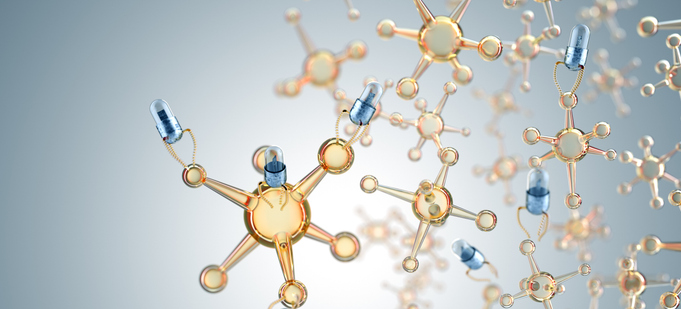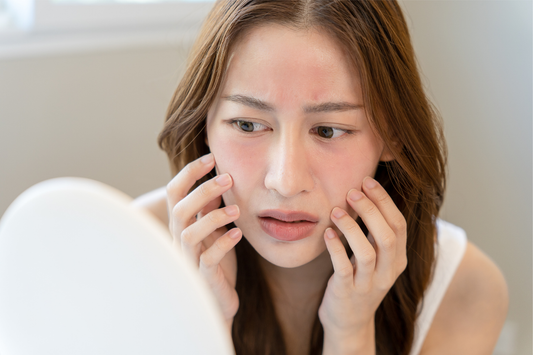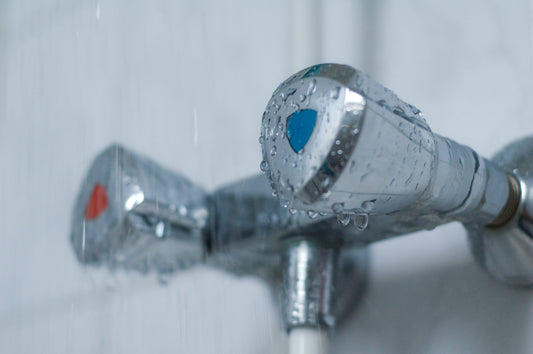by Jennifer McKinley, Founder, COR Silver Skincare
Peptides! Peptides! Peptides! Maybe you've heard skincare and beauty brands shouting about them lately?
We sure have. The world seems to be gradually discovering how peptides, especially marine collagen peptides, can help skin stay flexible, healthy and smooth. That means they're great for fighting fine lines and wrinkles, and maintaining firmness.
Here's a fun chart from Google Trends. It shows the rising number of people searching for the word "peptides" over the past few years:

Lots of companies are jumping on the bandwagon, but COR has proudly featured marine collagen peptides for skin since we first formulated our Silver Soap 16 years ago.
So what's the real deal with peptides — what are they anyway? What do they have to do with collagen? And why are they so beneficial for skin?
Here's a super clear, super quick breakdown of peptides, collagen, and your skin.
We always love a little science, and we think smart consumers always appreciate knowing what's real and what's nonsense among beauty trends.
What are peptides?
First off: Every cell in your body contains peptides! They're natural substances — not synthetic chemicals. Here are five things to know about them and why they can be so helpful to your facial skin. (We linked to five doctor-reviewed sources at the end of this post, in case you want to double-check these facts.)
- Peptides are "short chains of amino acids" and are the building blocks that make up proteins. "Short" is an important word here. Because they are very small, peptides are able to penetrate through your skin's protective barrier to be absorbed by the skin cells.
- Different peptides have different jobs. Some are classified as carrier peptides, some as signaling peptides, while other types inhibit enzymes or microbes.
- Peptides mix together easily with other valuable skincare ingredients like vitamins, antioxidants and hyaluronic acid, without disrupting each others' good effects. As the National Institute of Health says, they have "good biocompatibility".
- To do their best work, peptides in a skincare product need a little time to work into your skin, rather than being washed off immediately. This means a foaming, moisturizing cleanser like COR - with our simple three-minute routine - is a great way to get the full benefits.
- Skin's flexibility and elasticity comes from the protein collagen, which, as you have guessed by now, is made up of peptides.
Why marine collagen peptides, specifically?
Just like there are many kinds of peptides, there are also several types of collagen, present in different areas of your body and performing different roles.
In your skin, collagen:
- Helps new cells grow in the middle layer, called the dermis
- Helps replace dead skin cells
- Gives your skin structure and elasticity
So far, so good.
Unfortunately, even by the time you reach your mid-20s, your body's collagen production can start to decline. Other factors like stress, smoking/vaping, and too much sun can make this problem worse.
When your skin absorbs marine collagen peptides, it works as a signal to help put your body's own collagen production back into a higher gear.
Why "marine"? Marine collagen is very similar to the collagen in the human body. This type of collagen is extracted from fish skin underneath the scales. This has very little environmental impact; in fact, it's a way to reuse a by-product of the fishing industry. Other types of collagen from the animal kingdom are less similar to human collagen, and also come from farm animals (cows, pigs) with a bigger environmental footprint.
Why "peptides", instead of fully formed collagen? Well, recall that peptides are small, whereas proteins are bigger chains made up of multiple peptides. As a result, full collagen molecules aren't as effective in skincare. They are too big and don't penetrate into skin cells very well. So we use the collagen peptides instead. (This is the same reason why the silver in COR is in the form of tiny nanoparticles.)
What about marine collagen peptide supplements?
Yes, you'll see marine collagen and peptides in protein supplements like powders or capsules. Those supplements, which are specifically formulated to be eaten, are a great way to increase collagen in other parts of your body, besides your face. Collagen peptides can be beneficial to bones, joints and organs too.
To be super clear, COR (like all skincare products!) is for topical use only - absolutely NOT intended for human consumption. Skincare goes directly on the skin. Don't eat Tide Pods, don't eat cosmetics, don't eat soap, this is common sense. 🙂
Where to learn more about marine collagen peptides
So: That's the short version on marine collagen peptides. Use them right, and they stimulate and aid your body in producing collagen, which keeps your facial skin firm, smooth, and resilient.
They are an important part of COR Silver Soap, working harmoniously alongside our other ingredients to make COR a multi-tasking wonder: nourishing, hydrating, cleansing and healing while using only 1 gram of soap each day.
Here are some sources and further information on peptides:
- Peptides and Your Skin Care Routine from Healthline
- Collagen: What It Is, Types, Function & Benefits from Cleveland Clinic
- What are peptides? What to know about this anti-aging ingredient from Health
- Peptides and cell penetration from the National Library of Medicine
- Marine collagen and its derivatives: Versatile and sustainable bio-resources for healthcare from Materials Science and Engineering
About the author: Jennifer McKinley started COR in 2003 to help restore her own sun-damaged, acne-prone skin. She advocates for more science and proven natural ingredients (and less beauty industry "technobabble" and pseudo-science).





